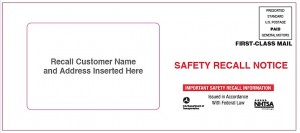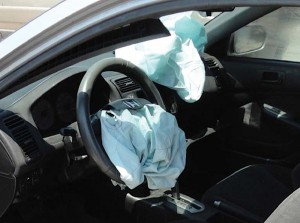Have you received a recall for your car, truck or crossover? Maybe several? If so, chances are you’re growing frustrated and dissatisfied as a result.
A new study finds that, despite an overall increase in quality, the epidemic of recalls that reached an all-time record of 64 million vehicles last year has left Americans less happy with the cars and trucks they drive than at any time in more than a decade. And with the spate of new recalls showing little sign of slowing, the situation isn’t likely to improve anytime soon.
“While it is true that all cars are now much better than they were 10 to 20 years ago, it is alarming that so many of them have quality problems,” said Claes Fornell, chairman and found of the American Consumer Satisfaction Index.
After years of decline, the auto industry has rapidly ramped up the number of vehicles recalled due to safety problems in recent years. General Motors alone recalled more than 30 million vehicles in the U.S. in 2014 to address a wide range of problems that included a deadly ignition switch defect. Manufacturers traditionally known for their safety and quality, such as Honda and Toyota, have added millions more vehicles, including many impacted by faulty Takata airbag inflators.
(More airbag trouble for Honda? Click Here to find out about the latest NHTSA investigation.)
All told, the industry recalled about 64 million vehicles in 2014, roughly twice the previous industry record set a decade earlier. And while it is too early to tell if that tally will be broken again in 2015, the numbers have been growing fast, in part due to the ongoing Takata problem. Meanwhile, federal regulators have promised a crackdown on safety issues, like the GM ignition switch problem, which might have gone unnoticed in the past.
According to the 2015 American Consumer Satisfaction Index, this year’s automobile satisfaction score slipped by nearly 4%, to 79 out of a possible 100. That’s the lowest it has dipped to since 2004.
(Millions more vehicles could be affected by an expanded Takata recall. Click Here to find out why.)
Recalls, however, are only part of the problem. Fornell also pointed to rising automobile prices. According to industry analysts, Americans are now paying more than ever for their vehicles.
A study by data site Edmunds.com found the average vehicle cost $32,932 in July, an increase of 11% since 2010. That figure may be slightly misleading, however, as it compares what relatively free-spending motorists are paying for often heavily loaded vehicles today while buyers in 2010 often trimmed back purchases during the depths of the recession.
The latest American Consumer Satisfaction Index tracked 27 of the automotive brands marketed in the U.S. and found only two, Acura and BMW, increased their scores this year, another 15 declining. The satisfaction scores remained stable for the remaining 10.
Chrysler posted the biggest dip, its score falling by 9%. The sibling Jeep brand fell 5%, as did Nissan, Kia, GMC and Volkswagen.
This was the third consecutive annual decline in the study which was based on a survey of 4,300 American consumers.
(U.S. highway deaths surging to eight-year high. Click Here for the latest.)




For most people, taking their vehicle in for service or warranty work is an inconvenience. Having to do this frequently can become a huge burden for many single parents, the elderly and others.
Also you can trace almost every recall to more government regulations that’s a fact Jack
Bob,
That’s fundamentally flawed logic. Of course, every recall is the result of regulation. No regulations and there legally can be no safety recalls. Prior to the law manufacturers still dealt with safety issues but in a willy-nilly manner. They would often ignore issues entirely or make repairs only when customers complained. It was rare to never that makers would actually notify an entire group of owners of a broad safety defect and advise them to come in for repairs. In fact, manufacturers didn’t necessarily track or analyze safety issues. In other words, without the regulations, consumers were largely on their own.
The safety regulations in place now require manufacturers to monitor – and report – complaints, crashes, etc., so they actually know what is happening with their products. As a result, they are supposed to have a good sense when there is a safety issue before you wind up having tens, 100s, even 1,000s of people killed or injured. (Note, as regulations have been more tightly enforced you have fewer cases of Firestone 500 or Ford Explorer instances where the number of people hurt were positively huge.) Safety defects are now caught much more quickly, in some cases before many or any vehicles actually reach consumers.
Occasionally, we see recalls that raise eyebrows, like the recent one involving Honda door stickers because they listed the wrong tire inflation numbers. But before you dismiss this consider the Ford Explorer case: the problem was greatly increased because motorists were mis-inflating tires. Even a seemingly minimal issue can have maximal impact. Tell a person they need 30 psi when it should be 36 and you can increase tire wear, reduce mileage…AND lead to catastrophic and potentially fatal blowouts.
Yes, one can argue about how some auto regulations are handled. The restrictions preventing the US from getting advanced laser headlights is one. But to take a knee-jerk, politically motivated anti-regulatory stand on recalls is just plain wrong. Enhanced safety standards are a major reason why we’ve seen U.S. highway deaths drop by 40% over the last three decades, even while the number of vehicles on the road, driving more miles at faster speeds has increased exponentially. Logic and facts, not politics, must be at the center of such a discussion, please.
Paul A. Eisenstein
Publisher, TheDetroitBureau.com